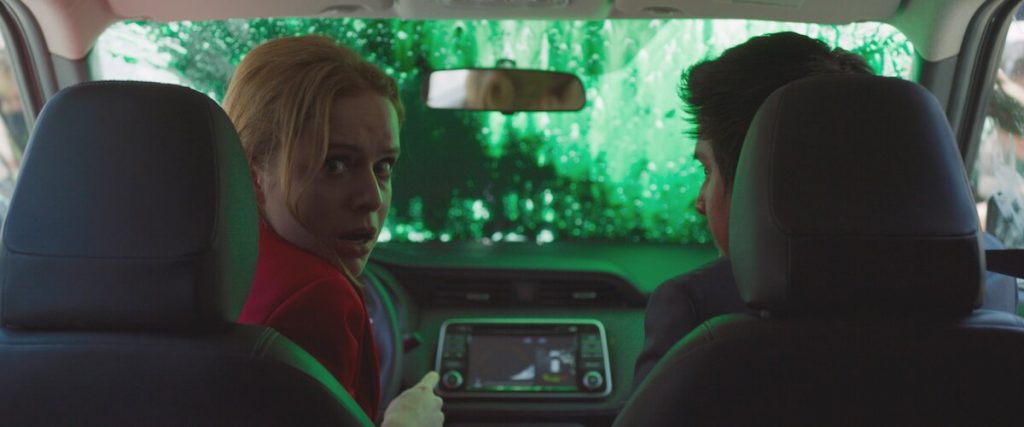Respond to these rapid questions in our New Order quiz and we will tell you which New Order character you are. Play it now.
Michel Franco’s “New Order” is a near-future dystopia that navigates a fractured society that is just hours away from collapsing. It is a relentless and blood-soaked study of social injustice that is gripping to watch despite its graphic and escalating brutality. Unfortunately, it is also one that only superficially acknowledges the importance of prosperity for all. In fact, the imprecision is so intense that you are frequently left wondering what exactly Franco’s film is trying to say about the universal topic of class warfare, and whether the writer/director is actually saying what he intends to say about this ever-important subject matter, amid some overt symbolism and various exploitative images of piling corpses.
Leaving the final judgment to the educated eye of the beholder has merit, not because films or filmmakers have a responsibility to prescribe to viewers a clear-cut and perfect ethical code and package it with a pretty bow. The problem with “New Order” isn’t so much that it lacks a clear sense of objectivity or amorality as it is that it is stubborn in its pursuit of the oppressor’s point of view while implying carelessly that “there are good and bad people on both sides.” It is entirely possible that “New Order” is attempting to align itself with films such as Bong Joon Ho’s “Parasite,” a masterwork that dissects the bloodsucking evil that is societal economic disparity with ingenious thematic and stylistic assurance. “New Order” is a film that has been compared to “Parasite” and “Parasite 2.” However, it may unintentionally resemble, of all things, Christopher Nolan’s “The Dark Knight Rises” in terms of tone and style. However, while Christopher Nolan’s Batman chapter, which depicts an uprising of the financially oppressed, deserves all of the credit for recognizing something was in the air (the film was conceived prior to Occupy Wall Street, but released during it), it left a confusing message behind by looking for its heroes in the wrong place: among the wealthier ranks of society.
This is more or less what Franco accomplishes in “New Order,” a film that spans approximately 90 tense minutes and tells the fictional story of a coup d’état that takes place somewhere in Mexico. The video commences in an abstract manner with a shot of a suggestive painting and a naked body splashed with green paint, both of which scream wealth and money when taken together. As a result of the sequence that follows, the implication is confirmed. We are on the grounds of a beautiful, upper-class estate owned by a family that appears to be well-off. In order to celebrate the marriage of their daughter Marianne (Naian González Norvind) to the successful Alan (Daro Yazbek Bernal), they host a formal affair attended by guests who are dressed in the latest fashion.
But you shouldn’t waste any more time and start this New Order quiz.
When Rolando (Eligio Melendez), a former, trusted long-time employee of the family, shows up uninvited at the house, he doesn’t look anything like the flashy guests. His humble beginnings begin with a conversation with the matriarch, Rebeca (Lisa Owen), who is already in a state of panic due to some unexplained green water coming out of the bathroom sink and doesn’t appear to have much time to spare for Rolando’s life-or-death predicament. Despite this, the elderly gentleman swallows his pride and requests a large sum of money to cover the costs of his wife’s heart surgery. In his explanation, he explains that the procedure is taking place at a private and expensive hospital because he was forced to transfer her due to violent protests taking place throughout the city. (Are we supposed to place the blame on the protestors in this situation? It’s difficult to tell.) Rebeca, as well as Marianne’s brother Daniel, dismisses him with only a fraction of the resources he requires to succeed (Diego Boneta). The situation is brought to Marianne’s attention by her father Ivan (Roberto Medina), who has connections to the military, and her future husband, Rolando. When Marianne learns of the situation, she decides to give Rolando her monetary wedding gifts, but she is reprimanded by both her father and her future husband. “It’s your wedding day, so relax and enjoy yourself,” everyone says. Except that the celebrations come to a screeching halt when the protests on the streets seep into the property in the most violent way, and Marianne is forced to leave with Marta’s (Mónica del Carmen) son Christian (Fernando Cuautle) in order to locate Rolando and pay for the medical emergency.
New Order Quiz
When the military authoritarianism and governmental corruption seize the opportunity, the situation in the entire city worsens, almost completely erasing the distinction between classes. Despite the fact that it is an absorbing and impressively sure-handed piece of filmmaking, what follows—cases of mass murder, sexual assault, utter cruelty, and an ever-growing body count that Franco appears dangerously pleased to put on display—is extremely difficult to watch. In the film’s brief running time, Franco demonstrates above all else that he is an accomplished filmmaker, with his camera cleanly and confidently charting a period of social and political unrest of startling scale and scope, as seen in the trailer below. However, somewhere along the line, particularly when he decides to make the wealthy Marianne with a heart of gold the central character of the story (while keeping the majority of those on the other side of the social order anonymous), he loses his bearings. Or it’s possible that he never had much of a sense of direction to begin with.
Also, you will find out which character are you in this New Order quiz.
The film is currently showing in theaters.
For more personality quizzes check this: The Emperor S New Groove Quiz.





